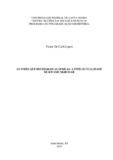| dc.creator | Lopes, Victor De Carli | |
| dc.date.accessioned | 2021-05-05T20:54:28Z | |
| dc.date.available | 2021-05-05T20:54:28Z | |
| dc.date.issued | 2019-08-28 | |
| dc.identifier.uri | http://repositorio.ufsm.br/handle/1/20783 | |
| dc.description.abstract | Mid-twentieth-century Africa had been fertile ground for an ambitious intellectual production.
The domino effect of political independencies has brought a uncertainty atmosphere concerning
the direction the continent would take, opening the way for the circularity of ideas that tensed
the struggle for independence and future projections backed by African perspectives with the
obstacles imposed by the colonization and neocolonialism. In this sense, the present dissertation
analysis the role of the intellectuality of Kwame Nkrumah in this conjuncture, a representative
choice given his notoriety in gaining independence in sub-Saharan Africa in Ghana (1957) and
becoming its first Head of State. The author's philosophy will be analyzed through the concepts
of African liberation, Pan-Africanism, neocolonialism and socialism, concepts which he was
one of the main advocate and one of the most successful philosophers in reframing and fixing
this contents. More than a mere epiphenomenon of his temporality, Nkrumah's utterances
influenced the reality around him. From the analysis of his context, his texts and the author, this
essay addresses the need to understand how the concepts appropriate by the Ghanaian author
were related to his context. Thus, it is a constitutive part of this paper the effort to understand
colonization and its consequences, the conceptualization of intellectuality and its epistemicide
implications on the peripheral thinking and the construction of an interpretation that allows the
author's concepts to be analyzed in his own words, using his own words and his main writings,
Africa Must Unite and Neocolonialism, and others that allow the creation of a textual corpus.
Finally, this work sums up to so many others stimulated by Brazilian Law 10,639/03 related by
the production of content that discuss and value for the Afro-Brazilian and African history and culture. | eng |
| dc.language | por | por |
| dc.publisher | Universidade Federal de Santa Maria | por |
| dc.rights | Attribution-NonCommercial-NoDerivatives 4.0 International | * |
| dc.rights.uri | http://creativecommons.org/licenses/by-nc-nd/4.0/ | * |
| dc.subject | Kwame Nkrumah | por |
| dc.subject | Pan-africanismo | por |
| dc.subject | África | por |
| dc.subject | Neocolonialismo | por |
| dc.subject | Pan-Africanism | eng |
| dc.subject | Africa | eng |
| dc.subject | Neocolonialism | eng |
| dc.title | As vozes que recriaram as Áfricas: a intelectualidade de Kwame Nkrumah | por |
| dc.title.alternative | The voices that recreated the Africas: the intellectuality of Kwame Nkrumah | eng |
| dc.type | Dissertação | por |
| dc.description.resumo | A África da metade do século XX fora terreno fértil para uma ambiciosa produção intelectual.
O efeito dominó das independências políticas inaugurara ares de incerteza quanto aos rumos
que o continente tomaria abrindo espaço para a circularidade de ideias que tensionavam a luta
por independência e projeções de futuro lastreadas em perspectivas africanas com os entraves
impostos pela colonização e o neocolonialismo. Nesse sentido, a presente dissertação analisa o
papel da intelectualidade de Kwame Nrumah nessa conjuntura, escolha representativa dada a
sua notoriedade ao conquistar, de maneira inédita na África subsaariana, a independência de
Gana (1957) e se tornar seu primeiro Chefe de Estado. A análise da filosofia do autor se dará
por meio dos conceitos libertação africana, pan-africanismo, neocolonialismo e socialismo,
conceitos que ele foi um dos principais defensores e um dos filósofos mais exitosos em
ressignificar e fixar seus conteúdos. Mais do que um mero epifenômeno da sua temporalidade,
os enunciados de Nkrumah influenciavam sobremaneira a realidade a sua volta. A partir da
análise de seu contexto, de seu texto e do autor, esse trabalho se direciona na necessidade de
compreender de que maneira os conceitos apropriados pelo autor ganês se relacionavam com
seu contexto. Assim sendo, é parte constitutiva desse trabalho o esforço para compreender a
colonização e seus desdobramentos, a conceituação de intelectualidade e suas implicações
epistemicídas no pensar periférico e a construção de uma interpretação que permita analisar os
conceitos do autor por suas próprias palavras, usando para tal seus principais livros, África Deve
Unir-se e Neocolonialismo, e outros que permitam a criação de um corpus textual. Por fim, esse
trabalho se soma a tantos outros impulsionados pela Lei 10.639/03 no que tange a produção de
conteúdos que tratem e valorizem a história e cultura afro-brasileira e africana. | por |
| dc.contributor.advisor1 | Armani, Carlos Henrique | |
| dc.contributor.advisor1Lattes | http://lattes.cnpq.br/3735821554238929 | por |
| dc.contributor.referee1 | Silva, Ricardo Oliveira da | |
| dc.contributor.referee2 | Santos, João Manuel Casquinha Malaia | |
| dc.creator.Lattes | http://lattes.cnpq.br/1087061551545903 | por |
| dc.publisher.country | Brasil | por |
| dc.publisher.department | História | por |
| dc.publisher.initials | UFSM | por |
| dc.publisher.program | Programa de Pós-Graduação em História | por |
| dc.subject.cnpq | CNPQ::CIENCIAS HUMANAS::HISTORIA | por |
| dc.publisher.unidade | Centro de Ciências Sociais e Humanas | por |



